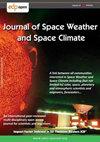Responding Trends of Ionospheric F2-Layer to Weaker Geomagnetic Activities
IF 2.7
2区 物理与天体物理
Q2 ASTRONOMY & ASTROPHYSICS
引用次数: 5
Abstract
Geomagnetic activities occur frequently in varying degrees. Strong geomagnetic activities, which have been widely investigated, occur occasionally; they can cause distinguishable and significant disturbances in the ionosphere. Weaker geomagnetic activities appear frequently, whereas their effects are generally difficult to be distinguished from complex ionospheric variations. Weaker geomagnetic activities play important roles in ionospheric day-to-day variability thus should deserve further attention. In this study long-term (longer than one solar cycle) measurements of the F2-layer critical frequency (foF2) were collected to statistically investigate ionospheric responses to weaker geomagnetic activities (Ap<60). The responding trends of low- to high-latitude foF2 to increasing geomagnetic activity are presented for the first time; they are statistically evident. Both increasing and decreasing trends can occur, depending on latitudes and seasons. The trend gradually transits from high-latitude decreasing trends to equatorial increasing trends with decreasing latitude, and this transition is seasonally dependent. As a result, the trend has seasonal difference at mid-latitudes. In general, the responding trend is more distinct at higher latitudes and in the equatorial region than at mid-latitudes, and the responding intensity is largest at higher latitudes. Although theoretically geomagnetic activities can disturb the ionosphere through multiple mechanisms, the morphology of the trend suggests that the frequent weaker geomagnetic activities modulate the high- to low-latitude ionosphere mainly through disturbing high-latitude thermospheric composition and further altering the background thermospheric circulation.电离层f2层对弱地磁活动的响应趋势
地磁活动在不同程度上频繁发生。已被广泛调查的强地磁活动偶尔发生;它们可以在电离层中引起明显的干扰。较弱的地磁活动频繁出现,但其影响通常难以与复杂的电离层变化区分开来。较弱的地磁活动在电离层的日常变化中发挥着重要作用,因此值得进一步关注。在这项研究中,收集了F2层临界频率(foF2)的长期(超过一个太阳周期)测量值,以统计研究电离层对较弱地磁活动的响应(Ap<60)。首次给出了低到高纬度foF2对地磁活动增加的响应趋势;它们在统计学上是明显的。根据纬度和季节的不同,可能会出现增加和减少的趋势。随着纬度的降低,趋势逐渐从高纬度下降趋势转变为赤道上升趋势,这种转变具有季节性依赖性。因此,这一趋势在中纬度地区具有季节性差异。总体而言,高纬度和赤道地区的响应趋势比中纬度地区更明显,高纬度地区的响应强度最大。虽然理论上地磁活动可以通过多种机制干扰电离层,但趋势的形态表明,频繁的较弱地磁活动主要通过干扰高纬度热层成分和进一步改变背景热层环流来调制高纬度至低纬度电离层。
本文章由计算机程序翻译,如有差异,请以英文原文为准。
求助全文
约1分钟内获得全文
求助全文
来源期刊

Journal of Space Weather and Space Climate
ASTRONOMY & ASTROPHYSICS-GEOCHEMISTRY & GEOPHYSICS
CiteScore
6.90
自引率
6.10%
发文量
40
审稿时长
8 weeks
期刊介绍:
The Journal of Space Weather and Space Climate (SWSC) is an international multi-disciplinary and interdisciplinary peer-reviewed open access journal which publishes papers on all aspects of space weather and space climate from a broad range of scientific and technical fields including solar physics, space plasma physics, aeronomy, planetology, radio science, geophysics, biology, medicine, astronautics, aeronautics, electrical engineering, meteorology, climatology, mathematics, economy, informatics.
 求助内容:
求助内容: 应助结果提醒方式:
应助结果提醒方式:


